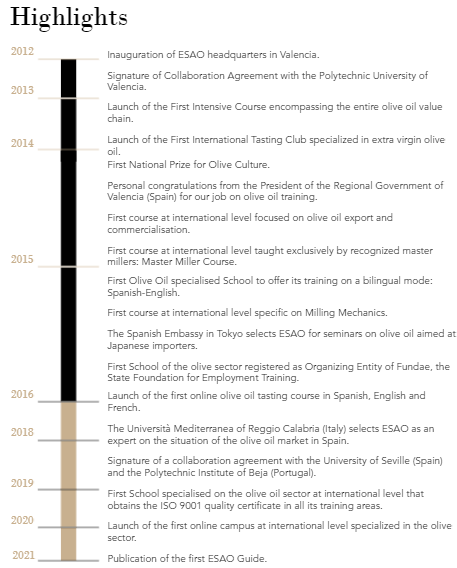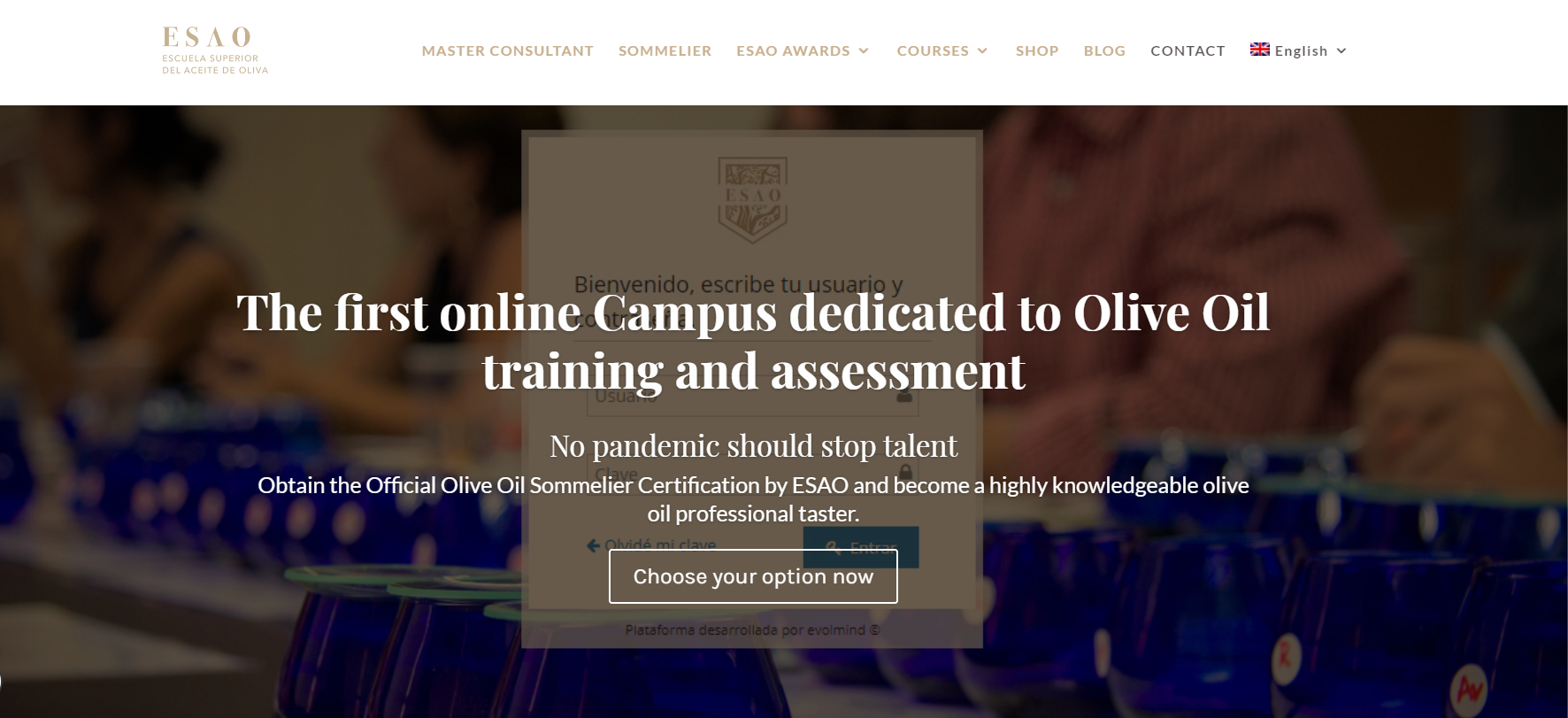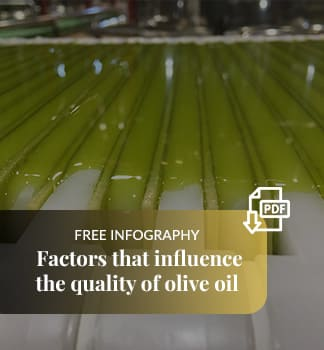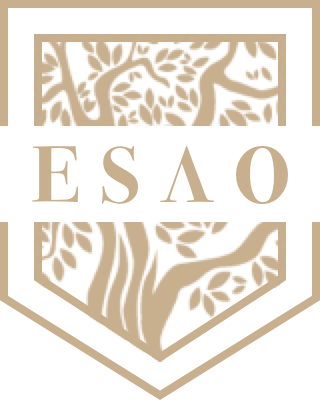We are going to start this article by describing what ESAO is and what its purpose is. The Olive Oil School of Spain - ESAO, was born in 2010 with the aim of offering training on the olive oil sector. It was the first highly specialized school in the Olive Oil sector.
ESAO is founded with a strong commitment to the education and culture of EVOO and to share the latest trends in the olive sector and offer our students all the support they need. We look to the future with an entrepreneurial nature. We are committed to technology applied to the development of the olive oil sector.
Eleven years after its foundation, the Olive Oil School of Spain is a pioneering school that develops the first online campus dedicated to training in olive oil. Throughout these years, ESAO has evolved in parallel with the olive sector, adapting to its needs and circumstances.
We defend diversity and promote innovation as a way to grow in this complex sector. We move fast and anticipate changes and challenges with innovative training proposals. We promote talent and all of our programs, from Certifications to Professional Courses, are based on the development of rigorous knowledge and an innovative mindset.
We have trained more than 900 professionals who use their knowledge every day to improve the quality of their work with olive oil and we would like to be able to help you.

The olive oil sector in Spain
Known for being a traditional sector, in which knowledge has been passed from father to son, the oil sector has great weight within the Spanish food industry. Traditionally, oil was sold in bulk in such a way that quality took a back seat and the utmost concern of an oil mill was to maximize its yield. Now this trend has changed and there is no turning back.
The culture of olive oil is gradually permeating every home in the world. Chefs are becoming aware that virgin olive oil can be one of the great raw materials in their kitchens and restaurants.
In today's society, and thanks to the rise of the Mediterranean diet and concern for well-being and health, we see that the sales of healthy products have increased, as well as products based on organic farming or certified as organic.
This combination of increasing olive oil culture, added to the concern for healthy products, makes us aware of the importance of one of the healthiest fats in the world: extra virgin olive oil.
These are some of the reasons why we have witnessed a turning point in the sector and that is why we see that quality is beginning to be an important factor to consider when producing olive oil.
Today quality is prioritized over quantity (although this belief is not fully established), and that is why the need for the sector to train arises. If I don't want to produce as much anymore, but I want to produce better oil, I will have to do things in a way that I am not used to.
Since until now performance was prioritized, the producer was content to produce large quantities but now that they are looking to produce quality oils, producing a lot is no longer enough.
From this approach, the need arises to train in order to produce a higher quality oil and in this way satisfy the increasingly growing demand for high quality extra virgin olive oils. Therefore, we can see that the olive sector is currently evolving and adapting to consumer trends.
For more than a decade, ESAO has imposed training as the best adaptation tool for the olive oil sector to respond to the needs of an increasingly demanding consumer.
At this juncture, of quality versus quantity, ESAO arises, as a specialized school in olive oil, with the aim of offering specific training to respond to the evolution of the olive oil sector.
How can I prioritize the quality of my oil?
Prioritizing the quality of our olive oil may seem easy at first glance, but the truth is that this process requires time, training and effort. However, we can break down this process into three phases in order to obtain an overview of what it means to prioritize the quality of olive oil.

First of all, we must identify and know what product we have and what product we want to sell. This is where the objectives we want to achieve are born. It is really important that the objectives are clear, but the strategies that will be followed to achieve them are even more so.
This first step is achieved only through knowledge, that is, what product we have, what are its characteristics, what position it occupies in the sector chain, what are its advantages or strengths and what are its weaknesses.
Once I have passed this first phase of training where I know exactly what product I have, I will be able to assess going to the second phase.
Then, already in phase two, we move on to improve quality. The objective of this phase is to improve the qualities of the oil. For this, it is necessary to know the trends and needs of the potential client. If I know the weaknesses of my oil, I will be able to work on them and improve them.
In this part of the process, training plays a very important role since it will always be positive to know new production techniques, how to use new specialized machines, learn new marketing strategies, etc.
At the end of the day, in this second phase of improvement, I will try to be better than my competitors in order to differentiate my brand and help my potential client when they are evaluating their purchase options.
Finally, the increase in sales will arise as a consequence of the development of the two previous phases. If I am able to know my product and improve it in everything necessary, sales will inevitably come.
A large part of the professionals in the olive sector focus their efforts solely on increasing sales, that is, focused only on the third phase of the process, without taking into account that they have skipped the first two steps that without them it is difficult to reach the third phase and the increase in the income statement. What they don't know is that by prioritizing quality, they will increase their sales in the long run. Increasing sales and prioritizing quality are not incompatible.
At this point we insist on training as a budget item for investment and not for spending in any company.
This change of perspective and the new concern for quality are not easy to manage and investment in training as well as in hiring good professionals is the best tool to be able to face this new trend that the olive oil sector presents both Spanish and international.
Extra Virgin Olive Oil of the highest quality
We define extra virgin olive oil as the highest quality, but how can we maximize the quality of the olive oil we produce? Next, we analyze in a generic and conceptual way the factors that influence the quality of olive oil and that we can control.
First, we analyze the olive grove. We select the plot that gives us the best olives. The time and methods of harvesting, the temperature and the means of transport used will influence the quality of the olive, and therefore of the oil.
When it comes to separating the olives, it is crucial to assess whether the olives are healthy, or if they have imperfections, pests, flies, etc.
The mill and its characteristics, its cleanliness, temperature and its revolutions need to be evaluated to guarantee the quality of the olive oil.
Regarding the blender, we see that the type of blender, its cleaning, the time and temperature of the blender, the addition of water, etc will be a key point in determining the quality of the oil.
On the other hand, following the production process, and going to the decanter, it is necessary to emphasize that its cleaning, filling, amount of water and temperature of the dough will be reflected in the quality of the oil.
Something similar happens with filtering, you have to have a professional knowledge of how it works and what is the best way to use both the cellulose and the earth, as this will also determine the quality of the oil. When the oil already passes to the winery, we cannot forget to continue prioritizing quality.
Olive Oil Cellars. ESAO bank image.
We must take into account the temperature of the cellar and the cleanliness of the tanks. Attention must also be paid to the inerting of the tanks as well as to the continuous purges, to be clear about the objective of maximum cleaning of the EVOO once it enters the tanks.
Finally, we must not forget that quality can sometimes be diminished in packaging. The material of the container, the temperature and light, the inerting in the bottle are going to be critical moments in which special attention must be paid not to neglect the quality that has cost us so much to produce.
The highest quality in our oil depends on many small details that we will have to take into account in all the following stages:
- plot selection
- optimal harvest time
- game division
- elaboration process
- filtered out
- store
- commercialization
At each of these points we can make our oil a high-end EVOO or a virgin olive oil or become a lampante.
This is the main reason why when hiring personnel for an oil mill, it is necessary to try to have professionals in the field of production and above all to distinguish well what would be the yard functions, the functions in the body of the factory and the filtering and other functions in the cellar.
The ideal situation and for which you have to bet is to have qualified and trained personnel in each of the stages.
Chemical composition of a quality oil - EVOO
Next, we analyze the characteristics of a chemical nature that a quality oil presents, that is, an extra virgin olive oil. Chemically we can differentiate two parts of EVOO: the saponifiable and the unsaponifiable fraction.
The saponifiable fraction is formed by triacylglycerols or more commonly triglycerides (fatty acids and glycerin). The "major component" of all oils are these triglycerides. The difference between triacylglycerols, of some oils and others, is in the fatty acids that form it and in their quantity.
In the case of virgin olive oil, oleic acid is the one that is in the greatest quantity, surpassing the rest of fats. Oleic acid is a monounsaturated fatty acid of the omega 9 series typical of vegetable oils, but in olive oil it is found in greater amounts than in other vegetable oils. Oleic acid exerts a beneficial action on blood vessels reducing the risk of cardiovascular disease, among other benefits that distinguish it from other components.
On the other hand, we have the unsaponifiable fraction, made up of terpenes and steroid compounds. This part represents a percentage less than or equal to 1.5% of the total composition, but nevertheless it is the part that differentiates virgin olive oil from other vegetable fats and oils. This unsaponifiable part is of great importance as it provides fat-soluble vitamins and antioxidants. In this part are the carotenes (provitamin A), alpha-tocopherol (vitamin E), beta-sitosterol, phenolic compounds and volatile compounds (alcohols, ketones, esters).
It is convenient to emphasize that extra virgin olive oil offers more beneficial health properties than other refined oils used for culinary purposes such as sunflower oil.
Any oil subjected to a refining process will lower in quality to any virgin olive oil, which, as its name indicates, has not been subjected to any physicochemical manipulation, but rather is an olive juice, with everything that a natural juice entails. It is necessary to remember that EVOO is the only one that offers the benefits from the unsaponifiable fraction since many refined oils lose these qualities with the refining process.
Susana Romera- ESAO Technical Director talks about the undervaluation of EVOO quality and its impact on demand
As we have commented previously, in the olive oil sector quality is not valued and this has an impact on the demand for olive oil. Susana Romera, technical director of ESAO, tells us about her vision of quality in the olive sector. Here, Susana answers some questions:
What is the situation of high quality extra virgin olive oils?
If we speak at a global level, the problem with extra virgin olive oils, specifically those of high quality, is that there is not a great demand. By this I mean that the end consumer, having such ignorance about the different qualities in olive oils, does not distinguish some oils from others and is governed mainly by price and image.
We have been able to verify that, depending on the increase in the culture of olive oil, the consumer is getting used to trying different quality oils, which positively affects their demand. This is so, because the consumer recognizes the sensory differences of one and the other, while he is understanding the virtues of the extra virgin for health.
Is anyone capable of evaluating the quality of olive oil?
Since I have been training people in oil tasting, what I have been able to verify is that, once the person gets used to this quality of oil, they no longer want to take other qualities.
So far there is no person who has passed through the School and who, after understanding what positive sensory attributes are, prefers to take a vineyard or a ravaged oil.
What do you think of the difference in prices in the different qualities of olive oil?
This is a shame, despite entering into these speeches, despite being one of the keys in the sale of EVOOs, it only leads us to "burn out". Undoubtedly, these few differences between an EVOO and a lampante, for example, have no justification that any consumer can understand.
How could we raise awareness in society to give value to EVOO?
The most important thing is that in the sector we must agree on the prices, we have to be clear about the differences between the qualities as well as clarify a series of aspects in order to later transmit solidity and confidence to the final consumer. It can be done through diffusion and culture. Culture must arrive, but it cannot be transmitted if the sector itself is not clear on a series of concepts and aspects and does not assume the value and differentiation of olive oil.
Sometimes we lose our energy with internal confrontations and we forget that we are a sector and as such we should be united and face another sector if necessary, such as other fats or refined products, but in no case between ourselves as a sector of the olive oil.
Among other things, there must be a clear difference in price and in the presence of the product at the point of sale. On a shelf, a sunflower oil cannot be placed next to an extra virgin olive oil, because it has nothing to do with it, one is a refined product and the other is a juice.
What can be done to ensure that the consumer buys quality oil?
Fraud in the olive oil market worldwide is a reality. Some companies take advantage of the ignorance of the final consumer, who buys according to the packaging and the price, without really knowing what quality the oil they are going to buy has.
The olive oil consumer buys blindly and from ESAO we want to do everything possible to make this change, we want the final consumer to have the information in their hand and to be able to choose one oil or another critically.
The final consumer of oil is often unaware of many important aspects of the quality of the oil. In the first place, the classification of olive oils and, therefore, the different qualities of olive oil on the market is often unknown. In addition, the possible defects and attributes that an olive oil can present are not known.
Despite this saddening situation, it is true that there are more and more controls and traceability of the quality of oils is more rigorous and reliable. However, we believe that the best way to reduce misinformation in the olive oil world is by promoting olive oil training.
Different systems have been planted to facilitate this knowledge to the consumer. For example, the creation of a labeling using QR codes has been proposed, which provides the consumer with the most important characteristics of olive oil, such as its attributes or the variety of the olive. From ESAO we support any action that fosters consumer awareness and the expansion of the olive oil culture.
Regarding the scope of the regulations in the olive oil sector, it should be noted that among all fats, olive oil is the only one that needs to pass a sensory analysis in order to obtain a certain labeling or quality certificate.
Sensory analysis is something that all people can get to know and practice, with which if we get the end consumer to worry about the quality of one of the healthiest fats in the world, such as virgin olive oil, we will achieve, little by little understand and it will be more difficult for fraud to be present.
From ESAO we offer different courses or certifications as Olive Oil Sommelier Certification whose objective of this certification is to achieve a deep knowledge of virgin olive oil tasting and also understand the process of making it. Our courses and certifications are a way to end olive oil consumer misinformation.
ESAO tasting course. ESAO Image bank.
Our olive oil courses
From ESAO we want to offer comprehensive training that allows our students to specialize in different fields of the olive oil sector. That is why we have developed courses that address very different areas of the sector: from the management of the olive grove, through tasting, production and oleotourism.
One of the main objectives of the Olive Oil School of Spain is that our students obtain a global and critical vision of the sector, and this is what we achieve through the degrees, where the student makes a more powerful immersion within the training olive oil.
We firmly believe that information is power and that knowledge is vital to be able to develop our companies. Only in this way will the sector grow in quality, recognition and professionalism.
Innovate to win
ESAO bets and has always bet on online training, doing its bit in the modernization and professionalization of the olive oil sector. We are committed to new technologies as a means of learning in the olive sector and as a tool to spread the culture of olive oil. This is not incompatible in any case with the face-to-face training that continues and will continue in our training.
Why choose ESAO?
1. Teachers with experience in the olive sector
Our courses and degrees include theoretical concepts that then have a practical application that the student can apply in their own business or job. From the school we want our students to learn from the best producers and experts in the olive sector. In order to offer a more practical approach. We have teachers with experience in the sector, who know first-hand the world of olive oil.For example, our export course is taught by a businessman who markets his olive oil in more than 40 countries.
Profiles like this, with experience in the sector and whose journey is an example to follow, are the type of professors and speakers that ESAO has. Although it could be easier to have university professors, with experience teaching lessons, from the Olive Oil School of Spain, we prefer to have professionals with their own experience in the sector, who can share their achievements but also their concerns about the sector of olive oil.
2. Bet on new formations
ESAO was the first school in the world to offer a course on the export and commercialization of extra virgin olive oil, or a Master of Almazara course where the protagonists were active oil mill masters, that is, the teachers were professionals in the production in olive oil.
Since its inception, we conceive the training of the olive sector as a global training, where the student has to see all the branches that touch the sector, since it is unthinkable to know about production and ignore, for example, sensory analysis and tasting, or not know what It interests the market to which I am going to sell, or not knowing the importance of packaging.
This is the reason that makes ESAO the only school where comprehensive training is given in the olive sector. We are constantly working on updating our courses and creating new ones so that our students receive up-to-date training.
3. Educate prioritizing quality
Our courses and degrees aim to convey to students the importance of prioritizing quality in each area of the olive oil sector. In each area of the oil sector, quality must be prioritized and, at ESAO, we believe that the best way to instill these values is to lead by example and offer quality training.
ESAO is ISO 9001 certified. The ISO 9001: 2015 Standard, drawn up by the International Organization for Standardization, determines the requirements for a Quality Management System.
We were awarded the first national prize for the dissemination of the olive oil culture, which shows that the work we do every day is endorsed and demonstrated by external entities.
4. International approach to the olive oil sector
With the growing boom in olive oil culture in Spain and abroad, we have witnessed a large increase in the number of international students. We have students of more than 15 nationalities, regardless of whether they are virgin olive oil producing countries or not.
In fact, this reality allowed us to carry out the entire online platform in several languages such as Spanish and English.
ESAO Alumni in tasting course in Japan. ESAO image bank.
Distributors, importers and the press from all over the world contact us to request different qualities of olive oil and advise them in this way in their purchase decisions, and this is one of the school's greatest values, since it means that they trust us.
.png)



